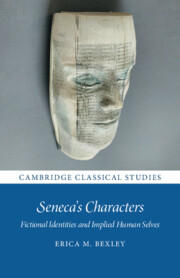Seneca’s Characters
Seneca’s Characters addresses one of the most enduring and least theorised elements of literature: fictional character and its relationship to actual, human selfhood. Where does the boundary between character and person lie? While the characters we encounter in texts are obviously not ‘real’ people, they still possess person-like qualities that stimulate our attention and engagement. How is this relationship formulated in contexts of theatrical performance, where characters are set in motion by actual people, actual bodies and voices? This book addresses such questions by focusing on issues of coherence, imitation, appearance, and autonomous action. It argues for the plays’ sophisticated treatment of character, their acknowledgement of its purely fictional ontology alongside deep – and often dark – appreciation of its quasi-human qualities. Seneca’s Characters offers a fresh perspective on the playwright’s powerful tragic aesthetics that will stimulate scholars and students alike.
Erica M. BEXLEY is an Associate Professor of Classics at Durham University. She has published in Classical Philology, The Classical Journal, Trends in Classics, the Cambridge Classical Journal, and Mnemosyne. This is her first book.

